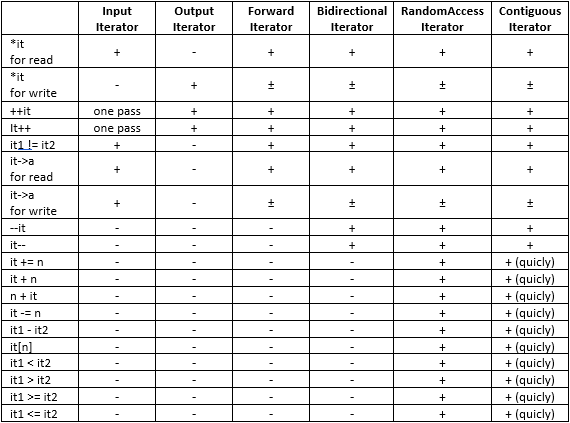Iterators are objects that implement an interface that accesses container elements. Their main purpose is to provide an opportunity to work with various containers in a common manner. This allows you to use the same functions and algorithms. With the use of iterators, you can iterate over objects inside any container. Iterators may be useful when the containers cannot provide quick access to an arbitrary element.
Iterator is a lightweight object that stores only a pointer to the type of container objects. An iterator is defined by 5 template parameters, two of which are mandatory — the iterator category and the value type. You can obtain the value type by dereferencing the iterator. Such operations, as prefix and postfix increments (++), comparison (==, !=), and dereference (*), are overloaded for each iterator category. After executing the ++ operator, the iterator points to the next element in the collection, if it exists. The == and != operators return true or false, depending on whether the iterators point to the same object. In order to obtain the object, you can also use the dereference operation. Just like pointers, iterators have operations of dereference (*,->), increment (++) and comparison (==, !=).
Each container type has its own iterator. This is due to the peculiarities of the location of elements in memory and access to them. All iterators can be divided into the following categories:
A category is defined by operations that can be performed on it. Each of the first five categories includes the previous one. Thus, you can perform all operations of bidirectional, forward and input iterators on random access iterators. The table below shows all these categories. The table uses the following notation:

A cell with ± means that the operation can only be executed if the iterator is not constant.
Depending on the iterator category, it can be used in different standard algorithms. For example, the algorithm for counting algorithm numbers (std::count) can be applied to all types of iterators, except for output iterators. The sorting algorithm (std::sort) can be applied only to random access and continuous iterators.
The following example demonstrates how you can use iterators to calculate the sum in different containers:
#include <vector>
#include <deque>
#include <forward_list>
#include <set>
#include <string>
#include <iostream>
template <typename InputIt, typename T>
constexpr T sum(InputIt first, InputIt last, T init)
{
while (first != last)
{
init = std::move(init) + *first;
++first;
}
return init;
}
int main()
{
std::forward_list<int> flist { 0, 1, 1, 0, 1, 0, 1, 1, 1, 0, 1 };
std::deque<int> deque { 1, 1, 2, 3, 5, 8, 13 };
std::vector<float> vector { 0.3, 0.5 ,0.7 ,0.9 ,1.1 };
std::set<std::string> set { "One", "Two", "Three", "Four" };
auto flist_sum = sum(flist.begin(), flist.end(), 0);
auto deque_sum = sum(deque.begin(), deque.end(), 0);
auto vector_sum = sum(vector.begin(), vector.end(), 0.0f);
auto set_sum = sum(set.begin(), set.end(), std::string {});
std::cout << " flist_sum = " << flist_sum << "\n";
std::cout << " deque_sum = " << deque_sum << "\n";
std::cout << "vector_sum = " << vector_sum << "\n";
std::cout << " set_sum = " << set_sum << std::endl;
// flist_sum = 7
// deque_sum = 33
// vector_sum = 3.5
// set_sum = FourOneThreeTwo
return 0;
}To calculate the sum, use the sum template function that accepts two iterators and an initial value. The sum function uses such operations on iterators as comparison (!=), dereference for reading (*) and prefix increment (++). These operations can be executed for all categories starting with InputIterator and except for OutputIterator. InputIterator is the lowest of the five, so the function can work with all five iterator categories. If you want to determine the type of returned value, use init argument function.
If you want to obtain an iterator for beginning and the end of the sequence of elements, any container has the begin and end methods. The forward_list container uses forward iterators.The deque and set containers use bidirectional iterators. The vector container uses random access iterators. Calling functions for different containers results in instantiating a template with the corresponding iterator type and stored value type.
The C++ language prohibits assigning the value of one iterator type to another iterator type. Except for a constant iterator that can take the value of the identical (but not constant) iterator.
For more convenient work with iterators, you can use the following operations:
If you want to change the iterator's behavior or add extra functionality, use the adapter iterators. For example, the reverse_iterator adapter allows you to traverse the container in the opposite direction. The back_insert_iterator adapter allows you to insert the elements in the end of a container.
Iterators often simplify programming. However, if you misuse iterators, the compilers can't always track it. This may lead to undefined behavior. For example, you can compare iterators from different containers (V662) or dereference an invalid iterator (V783). PVS-Studio detects these and some other patterns of errors related to iterators via diagnostics V803, V789 and V738.

0